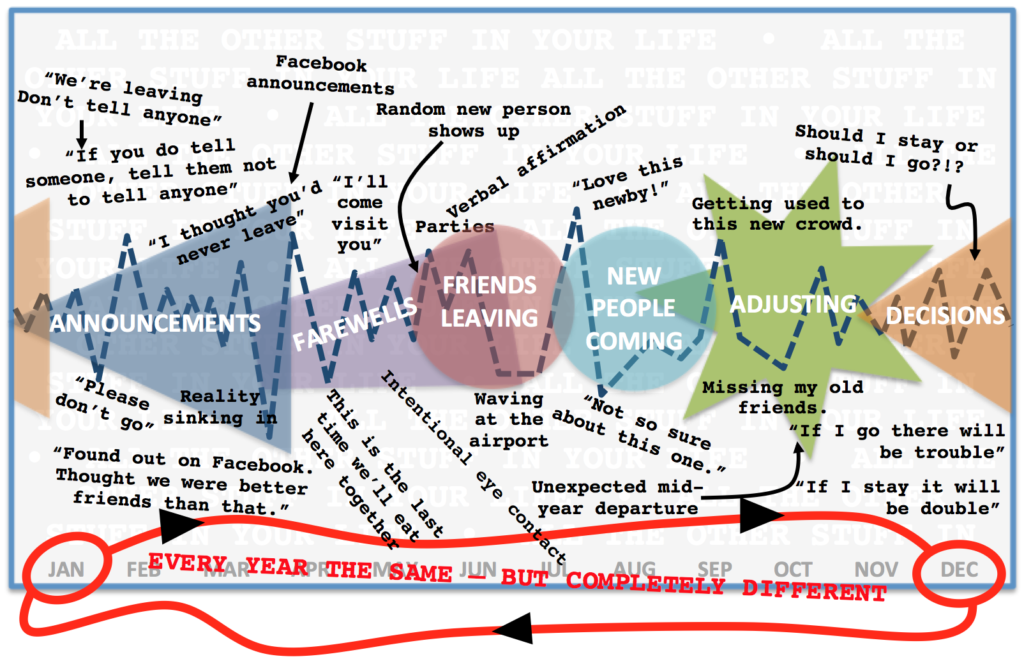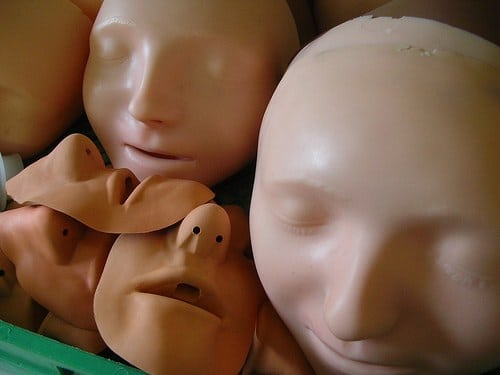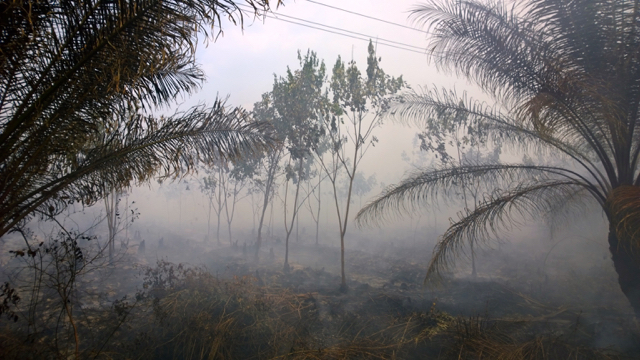A good buddy left suddenly two weeks ago. She got medical results that set an immediate departure in motion. The details that followed seemed staggering: Christmas plane ticket rebooked, notice to the job, selling furniture. I went over in the final stages of her packing to pick up her bicycle. Her apartment reflected the frenetic state that comes from rapid and unplanned circumstances. The 2 large suitcases packed, the carry-on nearly full and the remnants of everyday life left behind in the wake: books and magazines scattered, a jumble of left-over products lying about, and the obvious distraction and distress in the approaching deadline. The emotions of leaving, reviewing, decisions and time pressure mounted as the time for the taxi came nigh.
With my friend J's extreme transition of departure from country, way of life and community, I was bereft. I don’t know when I will see her again. In my past of seasonal jobs, I often lived and worked with a small group of people for short periods of time. In that context, we formed intense everyday relations—they kind when they see you scurrying to the communal bathhouse in the morning—that were deep while we were together, but faded in departure.
 |
| In the day of homeless adventures. I'm holding a copy of Ed Byrne's book, "Vagabonding in the USA." |
My forever friends are precious and valued, especially in expatriate life. I am really happy and deeply grateful to welcome CBE to Phnom Penh tomorrow. I got introduced to CBE through my sister, when in 1991 in the midst of travels with seasonal employment, I needed a place to stay for about 6 months to deal with my own health circumstances. She had a small shed in her spot in the trailer park in a nice section of Boulder Colorado.
The small square building had a proper roof, windows, and a doorbell. While in Boulder, I worked three jobs, got my teeth taken care of, and soaked in the happiness of her space. After a while, she let me sleep in the top berth of her spare room, where I nestled in the small space, like living on an overnight train without the rickety motion. One night, I heard her laughing in her dreams.
The small square building had a proper roof, windows, and a doorbell. While in Boulder, I worked three jobs, got my teeth taken care of, and soaked in the happiness of her space. After a while, she let me sleep in the top berth of her spare room, where I nestled in the small space, like living on an overnight train without the rickety motion. One night, I heard her laughing in her dreams.
The antics started as we got to know each other. After a night of one too many margaritas, I was the one in slightly better shape to drive home. I put a key in the ignition of her Toyota Tercel and was mystified when it wouldn’t turn over. Then, as we turned on the interior light and collectively collapsed into a fit of tipsy and hysterical giggles over the key in my hand—the one that would have started my Toyota Corolla had I driven it to the bar.
 |
| https://s-media-cache-ak0.pinimg.com/736x/99/09/ cc/9909cc205cbac21bf195e3815968d604.jpg |
CBE came to Alaska a few years later, where I got my friends to help me secure a flight on a small plane into a lodge on the outskirts of Denali National Park. We hiked in the tundra mountains, reveling in the endless wild country. On the return trip, we had the small plane to ourselves and I joked about flight tricks. After we took off, he educated us. "These are positive Gs", he said, as he drew back on the yoke and the plane ascended quickly in the air.
My face felt a little tight then, under pressure."...and these are negative Gs!" as we plummeted down quickly, our bodies floating in the air secured by the seatbelts, laughing hysterically in the danger and thrill. As it did it again. And again. The pilot settled into a low and slow over the creek below. I looked out to see the water rushing over the rocks, a brown bear scurrying away before ascending for the final approach the landing strip next to the highway.
 |
| A similar size to the plane we flew in. https://s-media-cache-ak0.pinimg.com |
My face felt a little tight then, under pressure."...and these are negative Gs!" as we plummeted down quickly, our bodies floating in the air secured by the seatbelts, laughing hysterically in the danger and thrill. As it did it again. And again. The pilot settled into a low and slow over the creek below. I looked out to see the water rushing over the rocks, a brown bear scurrying away before ascending for the final approach the landing strip next to the highway.
In 2012, I went to see CBE in Tanzania for my 50th birthday. My sister, nephew and mother also joined us on safari. In the Serenghetti, we saw 13 lions sleeping in a single tree. "Holy Mother of God", the guide exclaimed. Later in the trip, after a difficult medical situation with my mother in a remote part of the country and my family's scheduled flight back home, Carrie and I returned to Dar Es Salaam. We had a goodbye dinner with some of her friends. There, I made a connection that led to another connection that invited me to Phnom Penh.
The pervasive need for friends, contacts and networks was brought to home last week when a filthy, disoriented and abraded Norwegian man came to the hospital where I work. I saw him in triage, finished a short task and then went down to the exam room to talk to him. He was naked in a gown, his clothes lying in the bottom of the waste bin and covered with dingy, salt water soaked gauze pads from the wound cleaning. He said his passport and money card were stolen, There was a moto accident. He was confused.
The security staff were relieved that I was helping. I went out with my colleague to buy him new clothes. Our tuk-tuk driver had seen him at the a public hospital earlier in the week, where he was kicked out for not paying a bill. I called the Embassy to discover he was well known to them already and they could do nothing until the family agreed to pay for a return ticket to Norway. I told the staff he could not sleep on our property. Later that evening. I got a message from his son and replied, then moments later a photo of him appeared in my Facebook newsfeed from a Cambodian samaritan encouraging people to help him and her contact info. I wrote to her too.
The next day was a national holiday. All diplomatic functions ceased and the hospital was also very quiet. My mailboxes were empty. No word from the son, the well-meaning samaritan did not reply. The man continued to hang around the hospital, inciting concern and anxiety from the staff and my own worries grew into the night. I wrestled with his profound vulnerability, the obligation of my response and the other deadlines pressing in on year end. I conjectured on the son, I sat with my own conflicting feelings on compassion and destain. The Norwegian continued to chain smoke just outside our waiting area.
The gates opened on Friday after calling the Embassy to tell them the man was still here. The son called me from Norway later and I was able to pass the phone to the father. The father looked healthier, rested and bright with relief. The security manager gave me information that his passport and bank card were found in a village north of Phnom Penh. In the afternoon, I received a briefing missive from the Embassy mentioning the imminent arrival of the Cambodian Immigration police, the status of travel arrangements and a head-shaking detail, "Next week, we can discuss how to get him securely on the flight to Norway without him running away again at the airport." The case was solved. I later learned our staff gave him a pillow and a blanket for sleeping.
I am now ready to welcome Carrie to Cambodia tomorrow. Ever thankful for a forever friend.
The pervasive need for friends, contacts and networks was brought to home last week when a filthy, disoriented and abraded Norwegian man came to the hospital where I work. I saw him in triage, finished a short task and then went down to the exam room to talk to him. He was naked in a gown, his clothes lying in the bottom of the waste bin and covered with dingy, salt water soaked gauze pads from the wound cleaning. He said his passport and money card were stolen, There was a moto accident. He was confused.
The security staff were relieved that I was helping. I went out with my colleague to buy him new clothes. Our tuk-tuk driver had seen him at the a public hospital earlier in the week, where he was kicked out for not paying a bill. I called the Embassy to discover he was well known to them already and they could do nothing until the family agreed to pay for a return ticket to Norway. I told the staff he could not sleep on our property. Later that evening. I got a message from his son and replied, then moments later a photo of him appeared in my Facebook newsfeed from a Cambodian samaritan encouraging people to help him and her contact info. I wrote to her too.
The next day was a national holiday. All diplomatic functions ceased and the hospital was also very quiet. My mailboxes were empty. No word from the son, the well-meaning samaritan did not reply. The man continued to hang around the hospital, inciting concern and anxiety from the staff and my own worries grew into the night. I wrestled with his profound vulnerability, the obligation of my response and the other deadlines pressing in on year end. I conjectured on the son, I sat with my own conflicting feelings on compassion and destain. The Norwegian continued to chain smoke just outside our waiting area.
The gates opened on Friday after calling the Embassy to tell them the man was still here. The son called me from Norway later and I was able to pass the phone to the father. The father looked healthier, rested and bright with relief. The security manager gave me information that his passport and bank card were found in a village north of Phnom Penh. In the afternoon, I received a briefing missive from the Embassy mentioning the imminent arrival of the Cambodian Immigration police, the status of travel arrangements and a head-shaking detail, "Next week, we can discuss how to get him securely on the flight to Norway without him running away again at the airport." The case was solved. I later learned our staff gave him a pillow and a blanket for sleeping.
I am now ready to welcome Carrie to Cambodia tomorrow. Ever thankful for a forever friend.




























